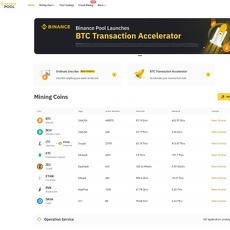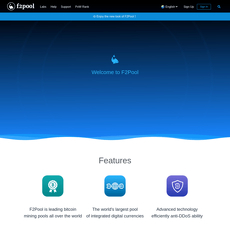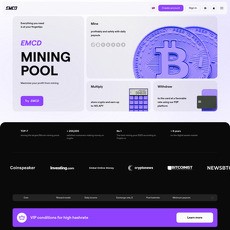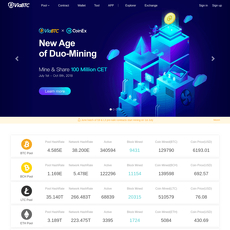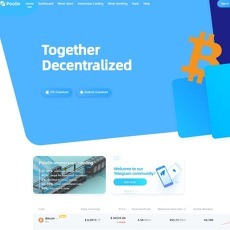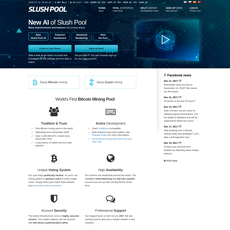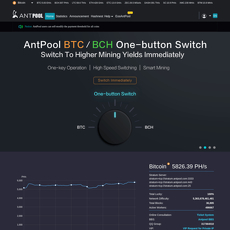Best Bitcoin Mining Pools (2026) – Fees, Payouts & Uptime
Bitcoin and Crypto Mining Pools: Everything You Need to Know with FAQ
Have you ever wondered how Bitcoin and other cryptocurrencies are actually mined? Or maybe you’ve come across this thing called “mining pools” and felt like you just walked into a sci-fi movie? You’re not alone. Crypto mining is fascinating, but it comes wrapped in a thick layer of tech talk that can feel hard to crack. Don’t worry—you’re in the right place to make sense of it all.
In this guide, I’ll help you understand Bitcoin and crypto mining pools in a way that’s simple, practical, and even a bit fun. Whether you’re new or just crypto-curious, we’ll cover all the basics of how these mining pools work, why they’re important, and how you can decide if they’re worth your time and effort. And if you’re already mining and wondering how to better leverage this strategy, stick around—there’s something here for everyone.
Why Understanding Mining Pools Can Be Overwhelming
Let’s be real—mining isn’t a walk in the park. It has its challenges. There’s the cost of specialized hardware, high electricity bills, and the sheer competition among miners to solve that elusive puzzle and strike the reward. Sounds daunting, right? But throw mining pools into the mix, and the doubts pile up even more: Which pool should I join? What about fees? Are the rewards really worth it?
If this already sounds like headache territory, you’re not alone. Hundreds of crypto enthusiasts have these same questions. And here’s why—it’s not just about plugging into a pool and watching profits roll in. The right decisions can make or break your mining experience.
You Don’t Have to Figure it All Out on Your Own
Here’s the good news: you don’t have to figure everything out by yourself. Mining pools can actually simplify your crypto journey once you know how they work. Think of them as a “teamwork makes the dream work” kind of situation.
Mining pools come with their own set of advantages—and some caveats—but this guide will break it all down step-by-step so you can stay informed and make the best choices possible.
But before we move forward, here’s a question to keep you thinking: What exactly makes a mining pool tick? Stick around because up next, we’re going to explore what Bitcoin and crypto mining pools really are, and trust me, that’s where the magic begins.
What Are Bitcoin and Crypto Mining Pools?
Ever heard the phrase, "Teamwork makes the dream work"? That’s exactly what mining pools are all about in the crypto world. To get started, let’s break it down into simple terms so you truly get what a mining pool does and if it’s something you should look into.
The Basics of Crypto Mining Pools
You’ve probably heard that mining Bitcoin is like solving super-complicated math problems, right? Well, unless you have a warehouse full of high-powered computers, mining on your own is like trying to win the lottery with a single ticket. Enter: mining pools.
A mining pool is a group of miners who come together to share their computing power. Think of it as a group project where everyone collaborates, increasing their chances of solving that math puzzle and securing rewards. When the pool mines a block, the reward gets distributed according to how much power each member contributed.
Why Do Mining Pools Exist?
Here’s the brutal truth: solo mining has become nearly impossible for most of us. The Bitcoin network difficulty has grown so much that competing with giant corporations or mining farms isn’t realistic for a regular person with limited hardware. Mining pools level the playing field.
By joining a pool, even small-scale miners can earn rewards regularly. Instead of waiting years to hit the jackpot on your own, you’re teaming up to share in the success more frequently.
How Do They Work?
So, how does this work in practice? It's pretty straightforward:
- You contribute your computer’s hash power to a mining pool.
- The pool combines everyone's power to solve mining puzzles faster.
- When the pool mines a block and earns a reward, the payout is split among the members based on their contribution.
Let’s say you contribute 5% of the total power in a pool that earns 1 Bitcoin for solving a block. You’d receive 5% of that reward, less any pool fees. It’s a consistent way to play the game without being crushed by massive competition.
Common Features of a Good Mining Pool
You might be wondering—if all pools sound similar, why should I care which one I join? Because the details matter. Choosing the right pool will greatly impact your profits and experience. Here’s what to look out for:
- Low Fees: Some pools charge higher fees for participation—usually a small percentage of the block reward. Aim for pools with reasonable and transparent fees.
- Reliability: Downtime equals lost rewards. Pick pools that have a strong track record of operating without interruptions.
- Hash Rate: A higher hash rate in a pool increases the likelihood of finding blocks quickly. Simply put, bigger pools have an edge.
- Transparent Payout Systems: Check how rewards are calculated and distributed. Some pools even display this data in real time.
"Transparency is to mining pools what trust is to relationships—it’s non-negotiable."
For example, popular pools like Slush Pool offer detailed reports and performance charts so miners can track exactly what they’re earning. This level of insight helps you stay in control.
If you’re starting to see why these pools matter, here’s the question: is it better than mining solo? What’s the smarter choice if you’re in it to win it? Read on, because the answer might surprise you.
Why Should You Join a Mining Pool Instead of Mining Solo?
Picture this: you’ve set up your fancy new mining rig, and you’re ready to rake in some Bitcoin. But as weeks go by, you’re not seeing as much as a single satoshi. Frustrating, right? That’s the reality of solo mining for most people today. Sure, it sounds great to be your own boss, but the odds are heavily stacked against you. Let me explain why joining a mining pool might be the smarter move.
The Economics of Mining
Crypto mining isn’t cheap, and anyone telling you otherwise is probably dreaming. There are two major expenses to consider: hardware and electricity. For solo miners, these costs can quickly spiral out of control, leaving you with nothing to show for all that effort.
Mining pools, on the other hand, spread the financial burden. Instead of shouldering everything alone, you pool your resources (pun intended) with others. Think of it like crowdfunding for cryptocurrency. Everyone contributes their computing power, and the spoils are divided among the contributors. It’s teamwork at its finest!
Here’s a powerful stat to chew on: in 2023, blockchain research estimated that over 65% of global Bitcoin mining happens in large pools. Why? Because solo mining is no longer feasible for the average miner. Mining pools simplify things while keeping you in the game.
Benefits of Joining a Mining Pool
Let’s talk about why mining pools are worth considering:
- Consistency: Rather than waiting for months (or years!) to hit the jackpot solo, pools give you a steady payout even if it’s smaller per block.
- Reduced Risk: Mining is unpredictable. With a pool, minor fluctuations won’t break you because the group carries the highs and lows together.
- Community: You’re not alone! Many pools offer forums or chat groups where miners share tips, troubleshoot issues, and celebrate wins.
It’s like regular income versus gambling. Sure, mining pools charge fees, but isn’t a steady stream of crypto better than an empty wallet?
Are There Any Downsides?
Of course, nothing is perfect (even in the world of crypto). Here are some potential downsides to consider:
- Fees: Most pools take a small percentage of your earnings as a service fee. It’s usually around 1-4%, but every decimal makes a difference.
- Shared Rewards: Since you’re splitting the pot with others, your share of each block reward is smaller.
- Less Autonomy: Pools dictate some rules, like minimum payouts or preferred software. You’ll need to adapt to their terms.
That said, the upsides usually outweigh the drawbacks for many miners. A pool minimizes the risk and allows you to see regular results, which is a huge relief for anyone getting started in mining.
"Alone we can do so little, together we can do so much." – Helen Keller
This couldn’t be truer in the world of crypto mining. Joining a pool is about banding together and making the impossible possible. Sure, it might mean sharing some of your earnings, but it also means you’re actually earning something, rather than spinning your wheels in frustration.
Still wondering how those crypto rewards are split within a mining pool? What’s fair and how do you make sure you’re getting your piece of the blockchain pie? Let’s decode mining pool rewards next!
How Do Mining Pool Rewards Work?
Let’s talk about what everyone cares about—money. Mining pools are all about the rewards, but how do they actually split the profits? If you've ever wondered where your share comes from or why payouts vary, you're in the right place. I'll break it down so it makes sense and show you how to spot what works best for you.
Common Reward Models
Not all mining pools pay the same way, and understanding reward systems can really help you pick the one that benefits you the most. Here are a few popular ones:
- Pay Per Share (PPS): This is like getting a guaranteed paycheck. Each share you contribute is worth a set amount, and you’re paid instantly—even if the pool doesn’t mine a block.
- Full Pay Per Share (FPPS): Similar to PPS but better. Along with block rewards, you also get a slice of transaction fees included in the block. A win-win for miners!
- Pay Per Last N Shares (PPLNS): Payment depends on the number of shares you contributed to the last successful block. It’s riskier but can pay more if you stick with the pool for a long time.
The cool thing about these models is that they let you choose what suits your risk appetite. For example, if you want stability, PPS is great. If you’re in it for bigger but less predictable payouts, PPLNS could be your pick.
Factors That Influence Payouts
Think you’ll make the same in any pool? Not quite. Here’s what affects your earnings:
- Your Hash Rate Contribution: The more computing power you bring to the table, the bigger your slice of the reward pie.
- Fees: Most pools take a small percentage of your rewards as a fee, usually 1-3%. Keep an eye on this—it adds up over time.
- Pool Efficiency: How effectively the pool’s combined power is used to mine blocks also matters. Higher efficiency = more blocks mined = better payouts.
And here's the kicker: Even weather can sometimes impact mining farms near hydroelectric power sources, affecting their uptime and, indirectly, rewards.
Some of the Top Mining Pools
If you’re not sure where to start, some mining pools have earned solid reputations for reliability and fair payouts. Here are a few worth checking out:
- F2Pool: A global favorite because it supports multiple cryptocurrencies and pays out using the FPPS model. It’s perfect if you want stable rewards.
- Antpool: One of the largest pools with competitive fees. It’s backed by Bitmain, which makes it a solid choice for ASIC users.
- Slush Pool: The first-ever mining pool, still standing the test of time. It uses a unique scoring method to reward consistent miners.
Here’s the thing to remember: While these pools dominate, smaller ones can also surprise you with lower fees or tailored benefits for niche miners.
Final Word (For Now!)
“The way to get started is to quit talking and begin doing.” Whether you're figuring out reward models or selecting your ideal pool, the trick is to do your research and take action. But what happens if you pick the wrong pool? Or what separates a good pool from a bad one? Don’t stress, I’ll explain everything you need to know next.
Choosing the Right Mining Pool: What to Consider
Choosing a mining pool is a big deal. It’s not just about numbers. It’s about finding a reliable partner that won’t cost you time, money, or the sanity you need for your next mining block. So, how do you figure out which mining pool is the best fit for you? Let’s break this down.
What to Look For
Imagine investing in a mining pool that promises the moon but delivers nothing but high fees and low payouts. Sounds frustrating, right? To keep your crypto mining journey smooth, always check these key factors when researching pools:
- Fees: Most pools charge fees, but are they reasonable? Typically, mining pools charge between 0% to 3%. Super low fees might seem appealing but often come at the cost of fewer features, unreliable payouts, or even potential scams.
- Payout Methods: Different pools use different reward models. Pay Per Share (PPS) ensures regular payments, while Full Pay Per Share (FPPS) also includes transaction fees. Know how and when you’ll get paid before joining.
- Hash Rate: A pool with a strong hash rate processes blocks faster, improving payout consistency. Keep an eye on the pool’s overall performance statistics.
- Location: Yes, this matters! The closer the pool servers are to you, the lower your latency, meaning faster submissions and fewer rejections.
- Reputation and History: How long has the pool been around? What are miners saying about it online? Pools like F2Pool, Slush Pool, and Antpool keep getting good reviews for a reason—they’re trustworthy and efficient.
- Support: If you hit a roadblock, does the pool offer customer service that’ll actually help? Look for active forums, user guides, or direct customer support options.
Comparison of Popular Pools
Let me share some quick insights into a few leading mining pools:
- F2Pool: Known for consistent payouts across Bitcoin and other cryptos. It’s beginner-friendly, with support for a vast number of crypto assets.
- Antpool: Popular for its massive network size and powerful resources. Miners with decent setups often see good results here.
- ViaBTC: Perfect if you're into a mix of mining coins and well-optimized payout methods, including FPPS and PPS+.
- Slush Pool: A pioneer in the mining game. It’s appreciated for having a fair payout style and transparent reports tailored for more experienced miners.
No matter which you pick, remember that some pools specialize in certain cryptocurrencies or cater to specific miner profiles. Your goal is to match up with one that aligns with your mining goals, equipment, and operating costs.
How to Avoid Scams
The truth is, the crypto world isn’t free from bad apples, and mining pools are no exception. Scams can leave you broke and angry. What can you do to protect yourself?
- Stick to well-known pools: Trust is earned. Only go for pools with a proven track record in the crypto community.
- Check reviews: Community forums like Bitcointalk or Reddit are great places to see real experiences shared by other miners.
- Avoid suspicious promises: If it sounds too good to be true (like "zero fees forever" or "100x faster payouts"), it probably is.
- Look for security features: Reputable pools should offer SSL encryption or even two-factor authentication to protect your account.
As the saying goes, “Trust takes years to build, seconds to break, and forever to repair.” Don’t take shortcuts here.
What’s the Best Choice for You?
Here’s a little secret: There is no “perfect pool.” It all depends on your location, hardware, mining strategy, and even how much risk you’re willing to tolerate. The real win comes in regularly checking your pool’s performance and being ready to switch if something better aligns with your goals.
But hold up—choosing a mining pool is just one part of the game. What about the tools you need to make all this mining magic happen? You won’t believe how critical the right gear and software are. Ready to set up your rig and start mining like a pro? Let’s take a look at what you’ll need!
What Gear and Software Do You Need for Mining?
Let’s talk about what really powers the magic behind cryptocurrency mining—your gear and software. Believe it or not, having the right tools can make all the difference between running a somewhat profitable operation and simply burning a hole in your wallet. So, if you want to do this right, here’s the lowdown on the essentials you’ll need for mining.
Hardware Requirements
First up, let’s talk hardware. You can’t just fire up your everyday laptop and expect to start mining Bitcoin tomorrow. That’s like trying to run a marathon in flip-flops—it’s not going to get you anywhere, and you might wreck your setup in the process!
- ASIC Miners: If you’re serious about mining Bitcoin, ASIC miners (Application-Specific Integrated Circuits) are the gold standard. These are specially designed just for mining and deliver unmatched processing power. Popular ones like the Bitmain Antminer series are widely used but can also cost upwards of a few thousand dollars. Expensive, yes, but they get the job done.
- GPU Mining Rigs: These are great for mining other coins like Ethereum or altcoins. Really dedicated miners often stack multiple GPUs into rigs, which look like something straight out of a sci-fi movie.
- CPU Mining: It’s outdated for most cryptocurrencies but can work for smaller ones or experimental coins. Think of this as the option for hobbyists, not serious miners.
- Cooling Systems: Mining rigs produce insane amounts of heat. Without proper cooling, you’re signing up for a meltdown—literally! Fans and liquid cooling systems are a must for maintaining performance.
Pro Tip: Always double-check compatibility between your hardware and mining pool requirements. Nothing’s worse than dropping cash on fancy equipment only to realize it doesn’t work with the pool you want to join.
Software Options
If hardware is the engine, then software is the steering wheel. You can’t go anywhere without the right software to control your mining setup and connect it to a pool.
- CGMiner: A solid choice due to its compatibility with various types of hardware. It’s open-source, so you can tweak it for maximum efficiency.
- BFGMiner: This one is similar to CGMiner but with more advanced features like dynamic clocking. Great for those who love tinkering.
- NiceHash: Want something beginner-friendly? NiceHash is an all-in-one platform that handles both hardware optimization and connection to mining pools.
A quick heads-up: some pools recommend specific software for compatibility or security reasons. Always read the pool’s recommendations before getting started.
“The right tools turn a challenge into an opportunity. Don’t just mine—mine smarter!”
Electricity and Costs
This is the part most beginners underestimate. Mining isn’t just about buying hardware and letting it run—it’s also about managing electricity costs. Mining rigs are energy-hungry monsters, and if your electricity rates are high, your profits can drain fast.
- Energy Consumption Chart: Every miner should keep an eye on the wattage their rigs pull. Tools like an electricity usage monitor can save you from nasty surprises on your next utility bill.
- Optimize Mining Times: In some regions, electricity rates drop during non-peak hours. Running your rig during these off-hours can save you a lot of money.
- Renewable Energy: If you’re serious about being eco-friendly—or just want to cut costs—look into solar panels or other renewable power options. A study by the University of Cambridge highlighted that over 39% of Bitcoin mining globally already relies on renewable energy sources. Why not join the trend?
Keep this in mind: mining isn’t a “set-it-and-forget-it” operation. You’ve got to factor in every detail, from mining difficulty to hardware maintenance and electricity bills, to avoid ending up with more expenses than rewards.
Ready to Start Mining?
You’ve got the gear, you’ve chosen your software, and you’re ready to plug into the mining pool of your choice. But what happens next? Are you curious about the next big steps or have burning questions about mining pools you still need answers to? Let’s clear up some of the mystery in the next part. Spoiler: You’re likely not the only one asking these questions!
Common Questions About Crypto Mining Pools (FAQ Section)
Let’s jump into some of the most common questions people have when they’re thinking about joining a mining pool. Whether you’re curious, skeptical, or just plain confused, I’ve got you covered here. These are the questions I’ve heard again and again, so don’t feel like you’re alone in wondering about them!
What Happens When All Bitcoins Are Mined?
This is one of those hypothetical scenarios people like to speculate about, and here's the thing: even after all 21 million Bitcoins have been mined (yep, that's the hard limit coded into Bitcoin), miners won’t just pack up and call it quits. They’ll still earn rewards from transaction fees.
Think about the Bitcoin blockchain like a massive highway. Even if no new cars are being made (no more blocks to freshly "mine"), you’ll always have vehicles driving through, paying tolls to use the road (transaction fees). So yes, mining still has a future—it just becomes more reliant on network activity rather than block rewards.
"When the mining stops, the blockchain won’t—miners will power it as long as transactions exist."
Is Mining Pool Membership Profitable?
Now, let's talk money. Whether or not joining a mining pool will be profitable for you depends on a few things:
- Your hardware: Are you running powerful ASIC miners or older GPUs? Your performance impacts your share of rewards.
- Electricity costs: If you’re paying sky-high energy bills, it might eat into your profits. Miners in regions with cheap power (think hydroelectric hubs or areas with government incentives) have an edge here.
- The pool’s payout structure: Pools with fair reward models, like FPPS (Full Pay Per Share), can make payouts steadier.
So, is it profitable? For many miners, yes. But you’ve got to run the numbers. Use tools like mining profitability calculators (there are some great ones out there) before you jump in headfirst. As they say, plan the trade before you trade the plan.
Which Pool Pays the Most?
The truth here isn’t exactly black and white. The "highest-paying pool" often depends on your mining setup and the pool's specific terms. However, some popular pools are known for delivering consistent results:
- F2Pool: Great for smaller miners looking for steady payouts.
- Antpool: A solid choice with a focus on transparency and performance metrics.
- Slush Pool: Perfect for miners who value the community aspect and a user-friendly interface.
Each of these pools has its perks, so it’s less about which pays the most and more about which fits your goals. Are you chasing reliability? Transparency? Maybe both? Evaluate pools with your specific needs in mind. And remember, the little details—fees, uptime stats, payout frequency—really do matter.
Can You Switch Pools?
Absolutely! Joining a mining pool isn’t like signing a contract with a cell phone provider (thank goodness). If you’re not thrilled with your current pool, you can switch to another with minimal hassle. Most mining software lets you adjust settings quickly, enabling you to point your hash power to whichever pool suits you best.
Think of this as keeping your options open. Certain pools might perform better during different network or market conditions. For example, if transaction fees spike, a pool that includes them in rewards (like FPPS models) might suddenly look a lot more attractive. Be flexible and stay active—it could land you better earnings.
Now, you’re probably wondering, how do you make sure switching pools doesn’t result in any downtime or lost earnings? Well, there’s a strategy for that…
What’s Next?
Ready to boost your mining profits? You don’t want to miss out on the tips I have coming up. From optimizing your hardware to choosing pools with the best fees, I’ll walk you through ways to make mining work harder for you. Curious about how to gain every advantage possible? Let’s keep going—you won’t want to stop here.
Tips to Maximize Your Mining Earnings
Crypto mining can be rewarding, but it’s not a “set it and forget it” kind of deal. If you want to squeeze every last satoshi out of your mining efforts, you’ve got to work smart. Let me share some actionable tips to help you rake in those rewards and stay ahead of the curve.
Optimize Your Hardware
Your mining hardware is your moneymaker, so treating it like gold (or Bitcoin?) is essential. Regular maintenance goes a long way—clean your machines to prevent overheating and make sure everything is running smoothly. Dust and poor ventilation can destroy your efficiency faster than you think.
And here’s the thing: hardware upgrades matter. If you’re still using an old rig, it could be killing your profits. Switching to a high-end ASIC miner can improve performance significantly. Yes, it’s an investment upfront, but the increased efficiency often pays off in the long run. Remember, in crypto, it's not always the strongest but the smartest who wins.
Pick Pools with Low Fees
Why let fees eat up your earnings? Paying an extra 2% or 3% in pool fees consistently adds up over time. Look at pools offering competitive fees without compromising on reliability. Compare options thoughtfully—sometimes a pool with slightly higher fees but a great track record might still be a better deal if payouts are steady.
Check for hidden charges too. Some pools advertise low fees, only to hit you with extra cuts later. Always go for transparent pools with clear payout structures. If you're unsure where to start, I’ve covered some of the best pools in another part of the guide that can help (hint: don't skip ahead yet!).
Keep an Eye on Market Trends
Crypto isn’t static—what works today won’t always work tomorrow. Staying updated on industry trends can mean the difference between running a profitable mining operation and bleeding money unnoticed. For instance, new coins or altchains popping up could offer better mining rewards while demand is low and competition isn’t fierce.
Also, watch out for sudden changes in mining difficulty or coin values. Tools and resources available online can make tracking trends a breeze. Some of my favorite platforms for staying updated are listed in other sections of this site .
Utilize Energy Savings
Electricity costs are a monster for miners. To cut back, explore deals with your power provider or even switch to renewable energy setups if possible. Solar panels, for example, might sound like a crazy upfront cost, but they could shave hundreds off your monthly expenses if your operation is large enough.
Another hack? Shift your mining operations to regions with lower electricity costs (if it’s an option for you). A lot of large-scale miners pick “crypto hotspots” like certain parts of Asia or Europe just for cheaper energy rates. Little details like this can significantly impact profitability.
Monitor Your Rewards
Don’t just set your rig up in a pool and walk away. Keep track of your profits daily—or at least weekly. Mining pools have different payout frequencies, and some might delay payments due to network congestion or other factors. If you notice anything off, it could be time to try another pool.
At the very least, set alerts for extreme changes in mining rewards. This way, you won’t be blindsided by a sudden drop in earnings or changes to pool policies.
Stay Sharp and Adapt
Maximizing your mining returns isn’t a one-size-fits-all strategy—what works today might need tweaking tomorrow. This is why it’s important to never get too comfortable. Are you ready to make the most of your setup? Then here’s the big question: how can you start smart without burning out? Don’t worry—there’s more ahead that’ll help you plan your mining journey.
Final Thoughts on Mining Pools: Start Smart!
So, what’s the final verdict on mining pools? If you’ve made it this far, you already know that mining pools can turn what feels like an impossible solo quest into a more manageable, community-driven effort.
Recap of Key Takeaways
Let me break it down one last time:
- Mining pools make it easier for smaller miners to stay competitive in a world where mining alone is almost financially impossible for most folks.
- They offer consistent rewards, even though you’re splitting the pie. It’s all about reliability over racing for that solo jackpot.
- Nothing’s totally free—you will have to factor in fees, payout structures, and pool trustworthiness. Do your homework.
The key is to look at mining pools like a partnership. No relationship is perfect, but when you find the right fit, it’s worth the effort.
Resources to Help You
To take things further, I recommend exploring some handy tools and deep-dive guides available on Cryptolinks. You’ll find everything you need to get closer to mining smarter rather than harder. Don’t skip this—resources like these have helped countless miners just like you.
Closing Words
If you’re serious about crypto mining, you HAVE to understand mining pools. There’s no way around it—they’re like the middle ground between going solo and doing nothing at all. The good news? You’ve got the knowledge you need to start smart and make solid decisions for whatever comes next.
Here’s my advice: start small. There’s no need to jump in with both feet and mega investments on day one. Test out a few pools, check out how your earnings look over time, and don’t hesitate to switch things up if something doesn’t feel right. A little patience and curiosity go a long way in this space.
"Teamwork makes the (crypto) dream work."
And with mining pools, that couldn’t ring truer. Go ahead, give it a shot—and who knows? Your next block reward might be closer than you think.

